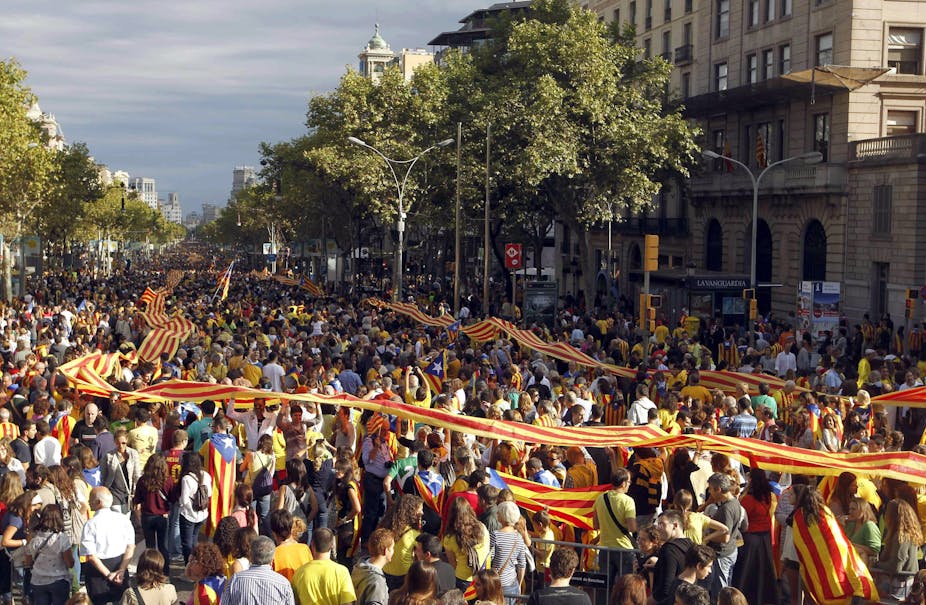An extraordinary event took place in Catalonia yesterday. Some 1.6 million people formed a human chain that covered the full stretch of the Catalan territory from north to south (400km), in a symbolic gesture emulating the 1989 Baltic Way. It happened on September 11, the Catalan National Day that commemorates the takeover of Catalonia by Spanish troops in 1714, and the participants joined hands 14 minutes after 5pm, or at 17:14 in the European system.
For years, the Catalan National Day has been used to express separatist sentiments, but it really gathered speed last year when over 1.5 million people demonstrated in central Barcelona. This year’s event attracted at least 1.6 million, despite only 400,000 officially signing up for it.
That figure is only in Catalonia itself. What is most remarkable about this year’s demonstrations is that similar events have been taking place around the world in the last few weeks, including in Sydney, Melbourne, Brisbane, Perth and Wellington and Auckland in New Zealand. Referred to as the “Catalan Way for Independence”, Catalans living overseas and other supporters of Catalan independence joined hands to form small human chains in a symbolic act of solidarity.
Catalonia’s regional autonomous government supports the idea of a referendum - similar to that in Scotland - to decide whether the Catalans split from Spain and form their own independent state. This referendum will likely take place in 2014, which will mark the 300 year anniversary of the loss of sovereignty to Spain.
The problem is that such a referendum would be unconstitutional. The Spanish Constitution of 1978, drafted during the transition to democracy after the death of Franco in 1975 and with military oversight, stated unequivocally that Catalonia is an “indissoluble unity of the Spanish nation”. The Constitution also positioned the military as the guarantor of this unity – which would make a military intervention legal in the case of a secession, an option immediately explored by right-wing groups.
When Catalonia called itself a “nation” in a new statute that it approved by a referendum in 2006, it was immediately challenged by the Spanish Constitutional Court. In 2010, after four years of legal battles, the court finally accepted the use of the term “nation” in regard to Catalonia, but only for historical and cultural reasons and with no legal value.
In January this year, the Catalan parliament approved a declaration of sovereignty that was again taken to Constitutional Court by the Spanish government, and is currently pending resolution. The Constitution was also evoked last year when Spanish prime minister Mariano Rajoy rejected the so-called “fiscal pact” – a measure that could have satisfied some sections of Catalan society and paved the way for a federalist option rather than a full independence.
Therefore, it is not surprising that the current action - a call for a referendum that could lead to the full secession of Catalonia from Spain - has been rapidly gaining support, with over 55% of Catalans supporting it.
Most commentators point to the global financial crisis and its disastrous effects on Spanish economy as one of the main reasons for the increase in support for independence. The Catalan economy is one of the strongest regional economies within Spain but opinions are divided on whether fiscal independence from Spain would greatly improve Catalonia’s chances of recovery from the economic crisis. However, in my conversations with Catalans in Barcelona earlier this year it was very clear that some are now embracing the separatist agenda in response to the economic situation.

Nevertheless, it would be wrong to assume that the economy is the main reason behind the drive for independence. Catalans have a very strong sense of national identity, and years of oppression have only strengthened their resolve to regain statehood. Catalonia was, after all, one of the most successful medieval kingdoms in Europe and a maritime power in the Mediterranean in 13th and 14th centuries.
Catalonia was not able to assert self-rule when many European nations achieved it in 19th century or at the end of World War One. It suffered further setbacks under the rule of General Franco (1936-1975), when its autonomy was revoked, its nationalism was repressed and its language banned. The terms of the Spanish transition to democracy in the late 1970s and 1980s didn’t allow for the possibility of self-rule.
It seems that now is the right moment, with Catalonia already part of the European Union as a region of Spain. The next step might be - as indicated by the main slogan of the current campaign, “Catalonia: a new state for Europe” - for full sovereignty within the structure of the European Union. This would be in accordance with the European tradition of “one nation, one state” that so many other European nation-states subscribe to.

